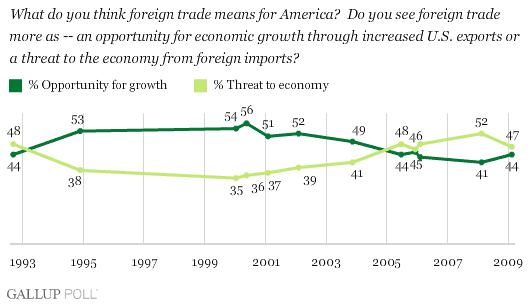Free trade seems to get all the blame when things go wrong and none of the credit when things go right. It’s the Rodney Dangerfield of global economics: it gets no respect. Certainly in this worldwide economic downturn globalism is going to take its bumps and bruises. And as trouble abroad comes to roost at home (and vice versa) more then ever the lesson is going to be how truly interdependent we all are.
In the short term there will certainly be increased popular sentiment that’s antagonistic toward expansion of liberalized trade policies. A recent Gallup poll shows that Americans showed that 47% view trade as a “threat to the economy from foreign imports” while 44% held that it is “an opportunity for economic growth through increased U.S. exports.” These numbers closely resemble the figures from the poll during the last major recession in 1992 (48% and 44% respectively).
While globalism will be in retreat for the short term, the beneficiary won’t necessarily be the localism so beloved by “crunchy” conservatives. The move will instead be toward a greater “regionalism,” of the kind fostered by continental and geographic “free trade zones.” In addition to the free trade deal announced today between Oceanic and Southeast Asian nations, you can expect NAFTA to get a close review in coming months.
But in the long term, the prospects for continued globalization are as good as ever. The Internet in particular has created a kind of “grassroots” globalism, that connects people in all kinds of social, economic, and cultural ways that were not possible a decade ago. More than ever we’ve come to know that our “neighbor” is not just the one we live in proximity to spatially, but those to whom we are connected virtually and spiritually.


